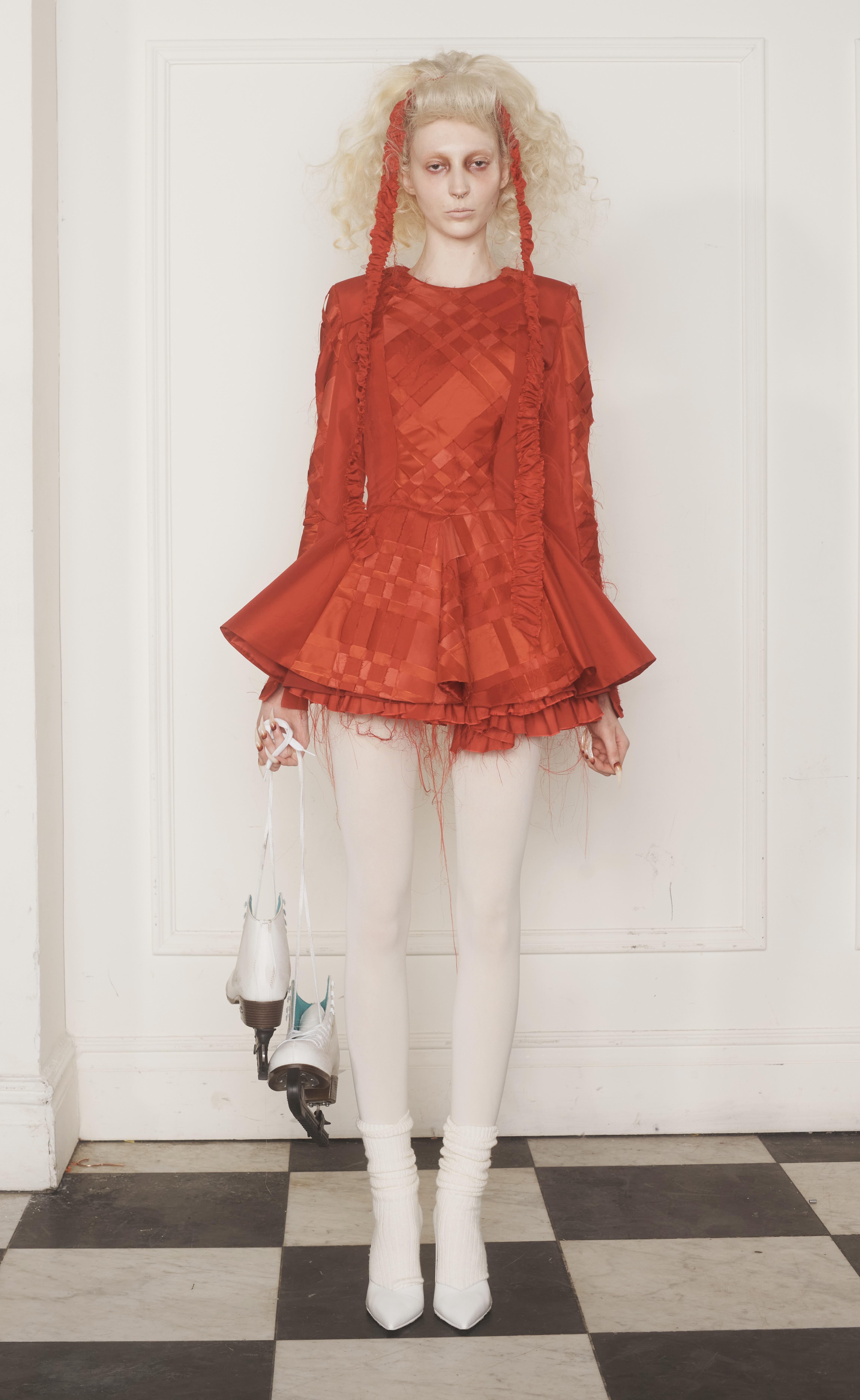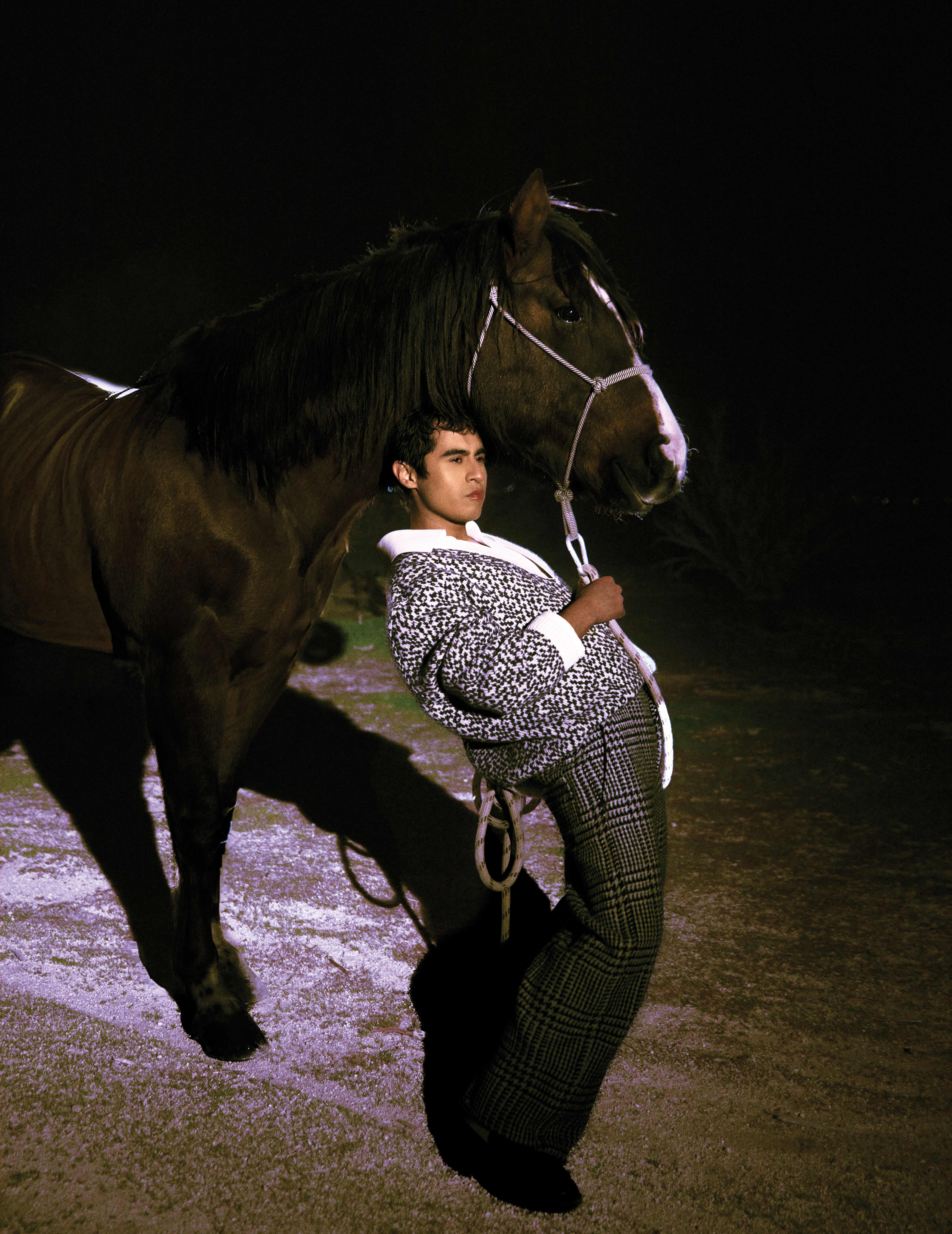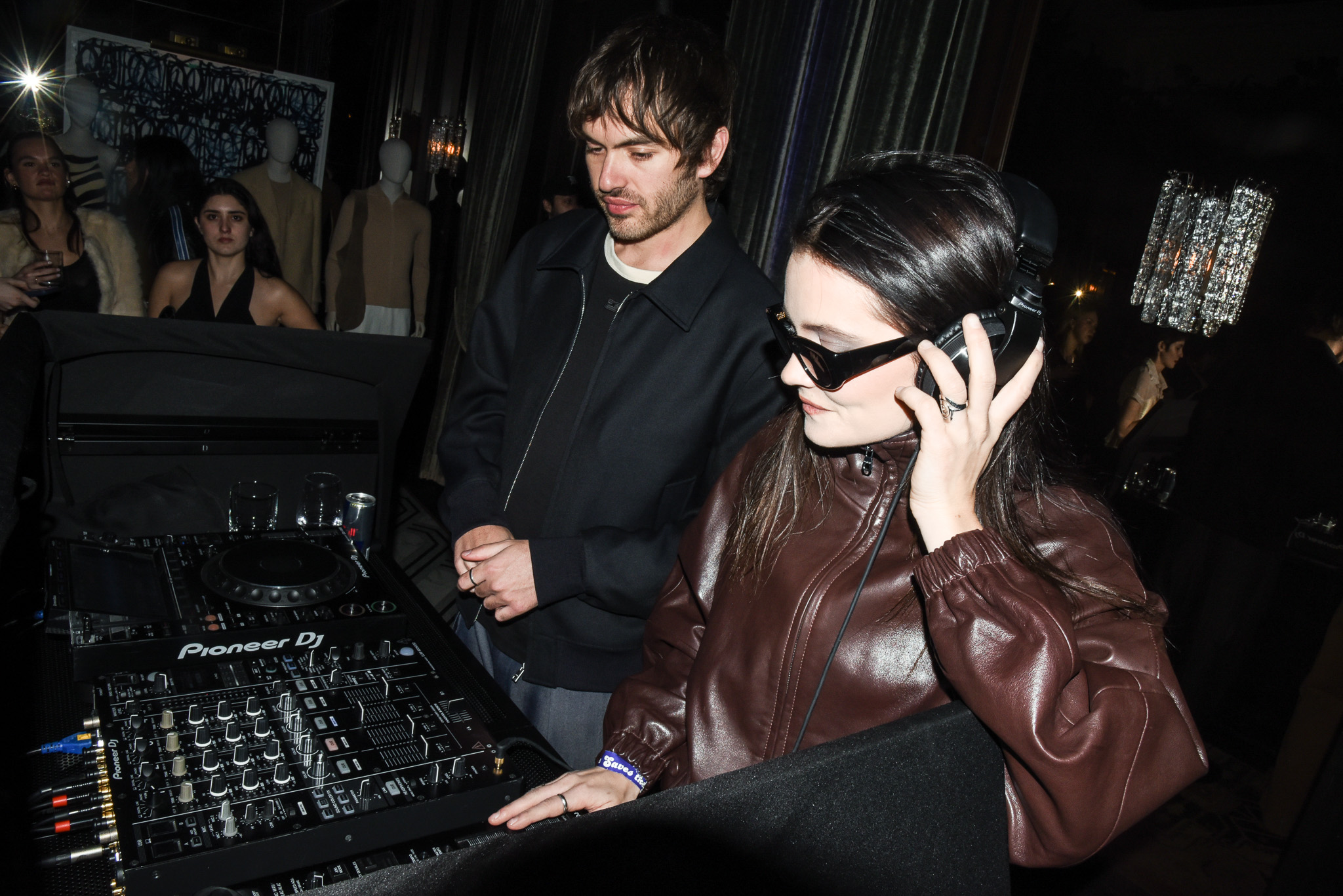

Johnny Depp’s laughter is creasing the prosthetic. He bends his head down, giggling into his lap, and when he emerges upward again, several tiny lines have appeared at the corner of either eye, both enhanced by distracting ice-blue contacts. The actor pulls the back of his palm to rest between his chin and his nose but it doesn’t change the obvious fact that his appearance has been mutated to look like a person who he is clearly not, someone so far from who he is in fact, that he may as well be wearing his own face if the audience is expected to feel at ease. Instead, Depp’s visage—sheathed in layers of plastic and a beige color so sickly it looks almost green—ignites revulsion akin to that of the uncanniest of valleys. The actor can just barely raise his eyebrow.
He’s supposedly in a dining room in Boston somewhere, yet here we are, watching him in a rinkydink theater, a quarter-full with Monday night thrillseekers. His voice is sandpapered by cigarettes. The laugh that tripwires the prosthetic is supposed to unsettle, but the room is not exactly sold. Monday night weariness is a friend of doubt. What are we even watching? Who is this supposed to be? What city is this? What year?
The film, _Black Mass_, which came out this October, is a violent mess of cold-hearted ruffians beating each other bloody, boilerplate Boston accents, and the garish champagne sunglasses of the newly-beloved ’70s. It’s a fine movie in that violence is cathartic, and the gangsters act like gangsters. The makeup artist for Depp’s role as Boston’s most notorious gangster, James “Whitey” Bulger, told the city’s namesake magazine that during the filming of _Black Mass_ some locals “couldn’t look at \[Depp\] because he looked so much like Whitey.”
But Johnny Depp’s face is peeling off like a sunburn and it’s nauseating. Benedict Cumberbatch is a mouth full of marbles and “I pahked the cah in Hahvahd yahd”’s. Nothing is so distressing than watching a true story get told by a troop of unaffiliated actors attempting to pull off roles that they do not embody, in a city in which they have no interest, and for a story that is best told through documentary. This kind of movie is a dime a dozen, and it’s got all the right moving pieces; yet a melting prosthetic face only serves to make the audience unsure of what they’re looking at. Performance of reality of a performance of a fiction. The pace shapeshifts and it’s alarming.
**I only entered this hall of mirrors to find the best possible version of myself**
**6h** Vin Diesel Fires Back at ‘Dad Bod’ Commenters By Flaunting Rippling Abs: “Body-Shaming is Always Wrong”
**6h** Vin Diesel Fires Back After Viral Photos of His ‘Dad Bod’
**5h** Vin Diesel Fires Back At Body-Shamers By Showing Off His Epic Six-Pack Abs
**5h** Vin Diesel rocks that ‘dad bod’—how d’ya like him now?
**5h** Vin Diesel Responds to Body-Shamers
**4h** Vin Diesel rebuffs critics after ‘dad bod’ photos emerge of him
**3h** Vin Diesel Shuts Down Body-Shamers—with Rock-Hard Abs!
**2h** See how Vin Diesel shut down body-shamers
**32m** Vin Diesel’s dad bod is already gone
**2m** Vin Diesel’s ‘Dad Bod’ Proves Hollywood Fat-Shaming Isn’t Just for Women Anymore
**The sun set in timeless splendor and I watched it all in the glow of my newly updated iPhone**
As of this writing, there are nineteen possible apps you can download if you’re a Facebook user, all intended to enhance the experience. All of the apps’ names read like words pulled from the bottom of a claw crane at an arcade—after plucking out a stuffed bear, you might also get a Riff, or a Strobe for Messenger. One might believe that it would be easy to figure out what they all do, but you’d be surprised. A BuzzFeed quiz might ask “Can You Guess What These Facebook Apps Do?” with that specific voice that is a little coy, a hair reproachful, but so eagerly wanting to be liked. By the end the reader would discover that Facebook, in all its silly forms, was good for us all along. All the extra fat around the edges is easily ignored, never trimmed. So many things happen in our periphery now, information we take in but discard.
Selfied for Messenger is the darkest offering of the all the apps, and not because of the outdated notion that selfies are uncool. Selfies are fine. Take your photo every day if you want. It seems to be the only lasting monument to ourselves that doesn’t get lost in the relentless static, so keep staring at your own face into perpetuity. The Selfied for Messenger app replaces prose with genuine human expression. It’s emoticons MKII.
A regression towards those facial muscles that we’ve been hiding these last few millennia behind prolonged lines of oblique prose. If Lord Byron were alive today, Selfied for Messenger would be a welcome timesaver. Why the app is called Selfied instead of Selfies is a question best left up to the copy stars of the Silicon Valley. Selfies are telling our stories now; we’re replacing words with images. Our ability to conjure language is inadequate.
Not to be outdone by its rival, Twitter announced something called Moments this month, “the best of Twitter in an instant.” Twitter exists in an instant already—it couldn’t happen any faster, not unless it perhaps just streamed endless selfies—but an instant is apparently too infinitesimal to keep up with. What’s the plot? Who’s the storyteller? Distilling several disparate instants into narratives might make everything easier, yet it is a regression to a time before Twitter—when collected information was delivered wholesale, not piecemeal. Everything is looping back to its origins through layers and layers of dissonance and discomfort. We’re getting the glitched version of our former selves. A digital loop-the-loop that flings us back towards the human essentials that we abdicated in the name of progress.
The press release for Moments is rippling with jargon that is assumed to be commonly understood—the kind that in high school we were told we’d grow accustomed to after a few chapters of _1984_. Words that sound normal—that feel normal—but if consulted for a definition, are impossible to ascribe meaning to.
“Every day, people share hundreds of millions of Tweets…citizens reporting events as they happen, cultural memes… We know finding these only-on-Twitter moments can be a challenge, especially if you haven’t followed certain accounts. But it doesn’t have to be… Swiping up or down dismisses the Moment and takes you back to the guide… The progress bar at the bottom indicates how much more each Moment has to offer.”
The words we used to associate with our humanity are replicated and retooled. It’s manipulation at our own hands, like stretching and contorting our limbs to stab ourselves in the back.
Ah, this magic moment. This magic, woozy moment.
**I’m not sure I have enough data on my plan for amnesia**
I’ve invented a game called Recall and the rules are very simple. You see how much you can remember of the small conventional things that happen every day. The farther back in time you go, the more points you are awarded. When you say you can no longer remember, you lose. If you lie to try to win the game, that is between you and your god.
Can you remember what the first thing you ate was yesterday?
Can you remember what the last thing you purchased with cash was?
Can you remember the last Saturday that you slept in late?
Can you remember the last Instagram photo that you uploaded? Can you remember what filter you used?
Can you remember the last day you slept through your alarm?
Which month this year felt the coldest?
Which month did you have the most money struggles?
Which month did you have the most sex?
Three months ago, do you remember how many likes you got on a photo you uploaded to Facebook?
What was your first Facebook password?
What did your first journal look like?
What was the first song you heard and loved?
What is your brother’s middle name?
What street did you grow up on?
Who bought your first phone?
What is your earliest memory?
Recall is a fun game because it’s really fucking hard.
**But Doctor, could I have a genetic predisposition to motion sickness?**
On Instagram, for holidays like Mother’s Day and Father’s Day, it is traditional to upload a photo of one’s mother or father, specifically if it is from when they were in their prime—say mid-20s. Scroll down to see a dad with a porny mustache, or a mom in hiphugging bellbottoms... Sometimes a military headshot sneaks in, an original sepia tone then shoved through an additional filter. A vintage filter on a vintage photo.
The captions are supposed to be sweet—a touching tribute to the people who raised you. Not many moms and dads have Instagram—let alone use it—but that’s beside the point. The images are largely for friends to admire the attractiveness of the people who gave birth to you. This is why it’s okay to call your mom hot.
“Wasn’t my mom a babe?” The people commenting on your photo agree. Your mom was a babe. No wonder you are so attractive. I mean, look who made you!
What is an appropriate tribute for a grandparent’s death in 2015? “Wasn’t my grandmom a babe?” When you die, your tombstone will read, “She was a babe and she’ll be missed.”
**What time is the Super Bowl?**
Godwin’s Law is when “as online discussion grows longer, the probability of a comparison involving Nazis or Hitler approaches one,” meaning that every topic that is brought to discussion online will eventually end up at the Holocaust.
**Throwback and flash forward or choose somewhere in between**
It’s 2009. Eight years since 9/11. Michael Jackson dies of a heart attack. Barack Obama is sworn in as the first black president. The New York Yankees predictably win the World Series. There’s a global pandemic called H1N1. Do you remember that? H1N1? It was an easy lazy Halloween costume for couples—one person wears a shirt that says H1, the other wears a shirt that says N1. Animal Collective was huge. In fact, writing about music on the internet was huge. Lady Gaga was doing her thing. It was a mildly interesting year.
It’s 2009 and the Pew Research Center does a study on 3,553 American adults and titles it “The Mobile Difference.” It looks at several different types of mobile web and desktop web users, mapping them by resistance or acceptance.
It’s 2009 and 10 percent of adults in the study “are unenthusiastic about the internet and cell phones.” They are labeled by Pew “The Tech Indifferent.” The Tech Indifferent “don’t see modern gadgetry as a tool for having more control over their lives, and, when they adopt a new device or service, they generally need help getting it to work.” What’s more, 14 percent of adults in the study are neither cell phone nor Internet users. “They are the oldest and least affluent group in the typology.”
They’re lower down on the tree, closer to the trunk where there’s less swaying, less nausea perhaps, but these people are throwbacks—the left-behind—hairier, more stooped, earlier snapshots from the simian lineup, backwards towards bows and arrows, towards tools of stone.
It’s 2009 and Derek Jeter is cradling the World Series trophy—its stiff silver tentacles shooting straight up like an anemone—and he says, “Now this thing is right where it belongs.”
**Dismal evolution**
We’re living in a post-Banksy world. Dismaland was another exhausted cliché. How can Bansky have any impact in a culture that uses memes for currency? So much is impermanent, potency is lost so quickly. Banksy can sell his art by Bitcoin. Banksy can comfortably retire.
Occupy Wall Street. What the fuck was up with that? Even web art is passé now.
**Serenity now**
It’s raining outside and I’m in the backseat of a car. I have headphones on as a friend drives, and the song I’m listening to has a strong pulsing beat. I am absentmindedly watching the windshield wipers move across the car’s windshield, processing very little information but the rain, the music, and the motion of the wipers.
The feeling strikes, the one that always knocks me off balance, and I recognize it immediately, trying to grasp it before it disappears. For four or five good, solid seconds, my music has synced up with the back and forth swipe of the windshield wipers, and for those few moments I convince myself that there are still wonders in the world, that anything is possible, that the vertigo induced by an unrepentant flow of information to my brainwaves can actually produce a titillating physical phenomenon. The way the beat hits is so completely aligned with the wipers, I’m left momentarily paralyzed.
Within six seconds, it’s gone. The rhythm is misaligned again, so I pause my music and close my eyes.
Written by Dayna Evans
 
Johnny Depp’s laughter is creasing the prosthetic. He bends his head down, giggling into his lap, and when he emerges upward again, several tiny lines have appeared at the corner of either eye, both enhanced by distracting ice-blue contacts. The actor pulls the back of his palm to rest between his chin and his nose but it doesn’t change the obvious fact that his appearance has been mutated to look like a person who he is clearly not, someone so far from who he is in fact, that he may as well be wearing his own face if the audience is expected to feel at ease. Instead, Depp’s visage—sheathed in layers of plastic and a beige color so sickly it looks almost green—ignites revulsion akin to that of the uncanniest of valleys. The actor can just barely raise his eyebrow.
He’s supposedly in a dining room in Boston somewhere, yet here we are, watching him in a rinkydink theater, a quarter-full with Monday night thrillseekers. His voice is sandpapered by cigarettes. The laugh that tripwires the prosthetic is supposed to unsettle, but the room is not exactly sold. Monday night weariness is a friend of doubt. What are we even watching? Who is this supposed to be? What city is this? What year?
The film, _Black Mass_, which came out this October, is a violent mess of cold-hearted ruffians beating each other bloody, boilerplate Boston accents, and the garish champagne sunglasses of the newly-beloved ’70s. It’s a fine movie in that violence is cathartic, and the gangsters act like gangsters. The makeup artist for Depp’s role as Boston’s most notorious gangster, James “Whitey” Bulger, told the city’s namesake magazine that during the filming of _Black Mass_ some locals “couldn’t look at \[Depp\] because he looked so much like Whitey.”
But Johnny Depp’s face is peeling off like a sunburn and it’s nauseating. Benedict Cumberbatch is a mouth full of marbles and “I pahked the cah in Hahvahd yahd”’s. Nothing is so distressing than watching a true story get told by a troop of unaffiliated actors attempting to pull off roles that they do not embody, in a city in which they have no interest, and for a story that is best told through documentary. This kind of movie is a dime a dozen, and it’s got all the right moving pieces; yet a melting prosthetic face only serves to make the audience unsure of what they’re looking at. Performance of reality of a performance of a fiction. The pace shapeshifts and it’s alarming.
**I only entered this hall of mirrors to find the best possible version of myself**
**6h** Vin Diesel Fires Back at ‘Dad Bod’ Commenters By Flaunting Rippling Abs: “Body-Shaming is Always Wrong”
**6h** Vin Diesel Fires Back After Viral Photos of His ‘Dad Bod’
**5h** Vin Diesel Fires Back At Body-Shamers By Showing Off His Epic Six-Pack Abs
**5h** Vin Diesel rocks that ‘dad bod’—how d’ya like him now?
**5h** Vin Diesel Responds to Body-Shamers
**4h** Vin Diesel rebuffs critics after ‘dad bod’ photos emerge of him
**3h** Vin Diesel Shuts Down Body-Shamers—with Rock-Hard Abs!
**2h** See how Vin Diesel shut down body-shamers
**32m** Vin Diesel’s dad bod is already gone
**2m** Vin Diesel’s ‘Dad Bod’ Proves Hollywood Fat-Shaming Isn’t Just for Women Anymore
**The sun set in timeless splendor and I watched it all in the glow of my newly updated iPhone**
As of this writing, there are nineteen possible apps you can download if you’re a Facebook user, all intended to enhance the experience. All of the apps’ names read like words pulled from the bottom of a claw crane at an arcade—after plucking out a stuffed bear, you might also get a Riff, or a Strobe for Messenger. One might believe that it would be easy to figure out what they all do, but you’d be surprised. A BuzzFeed quiz might ask “Can You Guess What These Facebook Apps Do?” with that specific voice that is a little coy, a hair reproachful, but so eagerly wanting to be liked. By the end the reader would discover that Facebook, in all its silly forms, was good for us all along. All the extra fat around the edges is easily ignored, never trimmed. So many things happen in our periphery now, information we take in but discard.
Selfied for Messenger is the darkest offering of the all the apps, and not because of the outdated notion that selfies are uncool. Selfies are fine. Take your photo every day if you want. It seems to be the only lasting monument to ourselves that doesn’t get lost in the relentless static, so keep staring at your own face into perpetuity. The Selfied for Messenger app replaces prose with genuine human expression. It’s emoticons MKII.
A regression towards those facial muscles that we’ve been hiding these last few millennia behind prolonged lines of oblique prose. If Lord Byron were alive today, Selfied for Messenger would be a welcome timesaver. Why the app is called Selfied instead of Selfies is a question best left up to the copy stars of the Silicon Valley. Selfies are telling our stories now; we’re replacing words with images. Our ability to conjure language is inadequate.
Not to be outdone by its rival, Twitter announced something called Moments this month, “the best of Twitter in an instant.” Twitter exists in an instant already—it couldn’t happen any faster, not unless it perhaps just streamed endless selfies—but an instant is apparently too infinitesimal to keep up with. What’s the plot? Who’s the storyteller? Distilling several disparate instants into narratives might make everything easier, yet it is a regression to a time before Twitter—when collected information was delivered wholesale, not piecemeal. Everything is looping back to its origins through layers and layers of dissonance and discomfort. We’re getting the glitched version of our former selves. A digital loop-the-loop that flings us back towards the human essentials that we abdicated in the name of progress.
The press release for Moments is rippling with jargon that is assumed to be commonly understood—the kind that in high school we were told we’d grow accustomed to after a few chapters of _1984_. Words that sound normal—that feel normal—but if consulted for a definition, are impossible to ascribe meaning to.
“Every day, people share hundreds of millions of Tweets…citizens reporting events as they happen, cultural memes… We know finding these only-on-Twitter moments can be a challenge, especially if you haven’t followed certain accounts. But it doesn’t have to be… Swiping up or down dismisses the Moment and takes you back to the guide… The progress bar at the bottom indicates how much more each Moment has to offer.”
The words we used to associate with our humanity are replicated and retooled. It’s manipulation at our own hands, like stretching and contorting our limbs to stab ourselves in the back.
Ah, this magic moment. This magic, woozy moment.
**I’m not sure I have enough data on my plan for amnesia**
I’ve invented a game called Recall and the rules are very simple. You see how much you can remember of the small conventional things that happen every day. The farther back in time you go, the more points you are awarded. When you say you can no longer remember, you lose. If you lie to try to win the game, that is between you and your god.
Can you remember what the first thing you ate was yesterday?
Can you remember what the last thing you purchased with cash was?
Can you remember the last Saturday that you slept in late?
Can you remember the last Instagram photo that you uploaded? Can you remember what filter you used?
Can you remember the last day you slept through your alarm?
Which month this year felt the coldest?
Which month did you have the most money struggles?
Which month did you have the most sex?
Three months ago, do you remember how many likes you got on a photo you uploaded to Facebook?
What was your first Facebook password?
What did your first journal look like?
What was the first song you heard and loved?
What is your brother’s middle name?
What street did you grow up on?
Who bought your first phone?
What is your earliest memory?
Recall is a fun game because it’s really fucking hard.
**But Doctor, could I have a genetic predisposition to motion sickness?**
On Instagram, for holidays like Mother’s Day and Father’s Day, it is traditional to upload a photo of one’s mother or father, specifically if it is from when they were in their prime—say mid-20s. Scroll down to see a dad with a porny mustache, or a mom in hiphugging bellbottoms... Sometimes a military headshot sneaks in, an original sepia tone then shoved through an additional filter. A vintage filter on a vintage photo.
The captions are supposed to be sweet—a touching tribute to the people who raised you. Not many moms and dads have Instagram—let alone use it—but that’s beside the point. The images are largely for friends to admire the attractiveness of the people who gave birth to you. This is why it’s okay to call your mom hot.
“Wasn’t my mom a babe?” The people commenting on your photo agree. Your mom was a babe. No wonder you are so attractive. I mean, look who made you!
What is an appropriate tribute for a grandparent’s death in 2015? “Wasn’t my grandmom a babe?” When you die, your tombstone will read, “She was a babe and she’ll be missed.”
**What time is the Super Bowl?**
Godwin’s Law is when “as online discussion grows longer, the probability of a comparison involving Nazis or Hitler approaches one,” meaning that every topic that is brought to discussion online will eventually end up at the Holocaust.
**Throwback and flash forward or choose somewhere in between**
It’s 2009. Eight years since 9/11. Michael Jackson dies of a heart attack. Barack Obama is sworn in as the first black president. The New York Yankees predictably win the World Series. There’s a global pandemic called H1N1. Do you remember that? H1N1? It was an easy lazy Halloween costume for couples—one person wears a shirt that says H1, the other wears a shirt that says N1. Animal Collective was huge. In fact, writing about music on the internet was huge. Lady Gaga was doing her thing. It was a mildly interesting year.
It’s 2009 and the Pew Research Center does a study on 3,553 American adults and titles it “The Mobile Difference.” It looks at several different types of mobile web and desktop web users, mapping them by resistance or acceptance.
It’s 2009 and 10 percent of adults in the study “are unenthusiastic about the internet and cell phones.” They are labeled by Pew “The Tech Indifferent.” The Tech Indifferent “don’t see modern gadgetry as a tool for having more control over their lives, and, when they adopt a new device or service, they generally need help getting it to work.” What’s more, 14 percent of adults in the study are neither cell phone nor Internet users. “They are the oldest and least affluent group in the typology.”
They’re lower down on the tree, closer to the trunk where there’s less swaying, less nausea perhaps, but these people are throwbacks—the left-behind—hairier, more stooped, earlier snapshots from the simian lineup, backwards towards bows and arrows, towards tools of stone.
It’s 2009 and Derek Jeter is cradling the World Series trophy—its stiff silver tentacles shooting straight up like an anemone—and he says, “Now this thing is right where it belongs.”
**Dismal evolution**
We’re living in a post-Banksy world. Dismaland was another exhausted cliché. How can Bansky have any impact in a culture that uses memes for currency? So much is impermanent, potency is lost so quickly. Banksy can sell his art by Bitcoin. Banksy can comfortably retire.
Occupy Wall Street. What the fuck was up with that? Even web art is passé now.
**Serenity now**
It’s raining outside and I’m in the backseat of a car. I have headphones on as a friend drives, and the song I’m listening to has a strong pulsing beat. I am absentmindedly watching the windshield wipers move across the car’s windshield, processing very little information but the rain, the music, and the motion of the wipers.
The feeling strikes, the one that always knocks me off balance, and I recognize it immediately, trying to grasp it before it disappears. For four or five good, solid seconds, my music has synced up with the back and forth swipe of the windshield wipers, and for those few moments I convince myself that there are still wonders in the world, that anything is possible, that the vertigo induced by an unrepentant flow of information to my brainwaves can actually produce a titillating physical phenomenon. The way the beat hits is so completely aligned with the wipers, I’m left momentarily paralyzed.
Within six seconds, it’s gone. The rhythm is misaligned again, so I pause my music and close my eyes.
Written by Dayna Evans

Johnny Depp’s laughter is creasing the prosthetic. He bends his head down, giggling into his lap, and when he emerges upward again, several tiny lines have appeared at the corner of either eye, both enhanced by distracting ice-blue contacts. The actor pulls the back of his palm to rest between his chin and his nose but it doesn’t change the obvious fact that his appearance has been mutated to look like a person who he is clearly not, someone so far from who he is in fact, that he may as well be wearing his own face if the audience is expected to feel at ease. Instead, Depp’s visage—sheathed in layers of plastic and a beige color so sickly it looks almost green—ignites revulsion akin to that of the uncanniest of valleys. The actor can just barely raise his eyebrow.
He’s supposedly in a dining room in Boston somewhere, yet here we are, watching him in a rinkydink theater, a quarter-full with Monday night thrillseekers. His voice is sandpapered by cigarettes. The laugh that tripwires the prosthetic is supposed to unsettle, but the room is not exactly sold. Monday night weariness is a friend of doubt. What are we even watching? Who is this supposed to be? What city is this? What year?
The film, _Black Mass_, which came out this October, is a violent mess of cold-hearted ruffians beating each other bloody, boilerplate Boston accents, and the garish champagne sunglasses of the newly-beloved ’70s. It’s a fine movie in that violence is cathartic, and the gangsters act like gangsters. The makeup artist for Depp’s role as Boston’s most notorious gangster, James “Whitey” Bulger, told the city’s namesake magazine that during the filming of _Black Mass_ some locals “couldn’t look at \[Depp\] because he looked so much like Whitey.”
But Johnny Depp’s face is peeling off like a sunburn and it’s nauseating. Benedict Cumberbatch is a mouth full of marbles and “I pahked the cah in Hahvahd yahd”’s. Nothing is so distressing than watching a true story get told by a troop of unaffiliated actors attempting to pull off roles that they do not embody, in a city in which they have no interest, and for a story that is best told through documentary. This kind of movie is a dime a dozen, and it’s got all the right moving pieces; yet a melting prosthetic face only serves to make the audience unsure of what they’re looking at. Performance of reality of a performance of a fiction. The pace shapeshifts and it’s alarming.
**I only entered this hall of mirrors to find the best possible version of myself**
**6h** Vin Diesel Fires Back at ‘Dad Bod’ Commenters By Flaunting Rippling Abs: “Body-Shaming is Always Wrong”
**6h** Vin Diesel Fires Back After Viral Photos of His ‘Dad Bod’
**5h** Vin Diesel Fires Back At Body-Shamers By Showing Off His Epic Six-Pack Abs
**5h** Vin Diesel rocks that ‘dad bod’—how d’ya like him now?
**5h** Vin Diesel Responds to Body-Shamers
**4h** Vin Diesel rebuffs critics after ‘dad bod’ photos emerge of him
**3h** Vin Diesel Shuts Down Body-Shamers—with Rock-Hard Abs!
**2h** See how Vin Diesel shut down body-shamers
**32m** Vin Diesel’s dad bod is already gone
**2m** Vin Diesel’s ‘Dad Bod’ Proves Hollywood Fat-Shaming Isn’t Just for Women Anymore
**The sun set in timeless splendor and I watched it all in the glow of my newly updated iPhone**
As of this writing, there are nineteen possible apps you can download if you’re a Facebook user, all intended to enhance the experience. All of the apps’ names read like words pulled from the bottom of a claw crane at an arcade—after plucking out a stuffed bear, you might also get a Riff, or a Strobe for Messenger. One might believe that it would be easy to figure out what they all do, but you’d be surprised. A BuzzFeed quiz might ask “Can You Guess What These Facebook Apps Do?” with that specific voice that is a little coy, a hair reproachful, but so eagerly wanting to be liked. By the end the reader would discover that Facebook, in all its silly forms, was good for us all along. All the extra fat around the edges is easily ignored, never trimmed. So many things happen in our periphery now, information we take in but discard.
Selfied for Messenger is the darkest offering of the all the apps, and not because of the outdated notion that selfies are uncool. Selfies are fine. Take your photo every day if you want. It seems to be the only lasting monument to ourselves that doesn’t get lost in the relentless static, so keep staring at your own face into perpetuity. The Selfied for Messenger app replaces prose with genuine human expression. It’s emoticons MKII.
A regression towards those facial muscles that we’ve been hiding these last few millennia behind prolonged lines of oblique prose. If Lord Byron were alive today, Selfied for Messenger would be a welcome timesaver. Why the app is called Selfied instead of Selfies is a question best left up to the copy stars of the Silicon Valley. Selfies are telling our stories now; we’re replacing words with images. Our ability to conjure language is inadequate.
Not to be outdone by its rival, Twitter announced something called Moments this month, “the best of Twitter in an instant.” Twitter exists in an instant already—it couldn’t happen any faster, not unless it perhaps just streamed endless selfies—but an instant is apparently too infinitesimal to keep up with. What’s the plot? Who’s the storyteller? Distilling several disparate instants into narratives might make everything easier, yet it is a regression to a time before Twitter—when collected information was delivered wholesale, not piecemeal. Everything is looping back to its origins through layers and layers of dissonance and discomfort. We’re getting the glitched version of our former selves. A digital loop-the-loop that flings us back towards the human essentials that we abdicated in the name of progress.
The press release for Moments is rippling with jargon that is assumed to be commonly understood—the kind that in high school we were told we’d grow accustomed to after a few chapters of _1984_. Words that sound normal—that feel normal—but if consulted for a definition, are impossible to ascribe meaning to.
“Every day, people share hundreds of millions of Tweets…citizens reporting events as they happen, cultural memes… We know finding these only-on-Twitter moments can be a challenge, especially if you haven’t followed certain accounts. But it doesn’t have to be… Swiping up or down dismisses the Moment and takes you back to the guide… The progress bar at the bottom indicates how much more each Moment has to offer.”
The words we used to associate with our humanity are replicated and retooled. It’s manipulation at our own hands, like stretching and contorting our limbs to stab ourselves in the back.
Ah, this magic moment. This magic, woozy moment.
**I’m not sure I have enough data on my plan for amnesia**
I’ve invented a game called Recall and the rules are very simple. You see how much you can remember of the small conventional things that happen every day. The farther back in time you go, the more points you are awarded. When you say you can no longer remember, you lose. If you lie to try to win the game, that is between you and your god.
Can you remember what the first thing you ate was yesterday?
Can you remember what the last thing you purchased with cash was?
Can you remember the last Saturday that you slept in late?
Can you remember the last Instagram photo that you uploaded? Can you remember what filter you used?
Can you remember the last day you slept through your alarm?
Which month this year felt the coldest?
Which month did you have the most money struggles?
Which month did you have the most sex?
Three months ago, do you remember how many likes you got on a photo you uploaded to Facebook?
What was your first Facebook password?
What did your first journal look like?
What was the first song you heard and loved?
What is your brother’s middle name?
What street did you grow up on?
Who bought your first phone?
What is your earliest memory?
Recall is a fun game because it’s really fucking hard.
**But Doctor, could I have a genetic predisposition to motion sickness?**
On Instagram, for holidays like Mother’s Day and Father’s Day, it is traditional to upload a photo of one’s mother or father, specifically if it is from when they were in their prime—say mid-20s. Scroll down to see a dad with a porny mustache, or a mom in hiphugging bellbottoms... Sometimes a military headshot sneaks in, an original sepia tone then shoved through an additional filter. A vintage filter on a vintage photo.
The captions are supposed to be sweet—a touching tribute to the people who raised you. Not many moms and dads have Instagram—let alone use it—but that’s beside the point. The images are largely for friends to admire the attractiveness of the people who gave birth to you. This is why it’s okay to call your mom hot.
“Wasn’t my mom a babe?” The people commenting on your photo agree. Your mom was a babe. No wonder you are so attractive. I mean, look who made you!
What is an appropriate tribute for a grandparent’s death in 2015? “Wasn’t my grandmom a babe?” When you die, your tombstone will read, “She was a babe and she’ll be missed.”
**What time is the Super Bowl?**
Godwin’s Law is when “as online discussion grows longer, the probability of a comparison involving Nazis or Hitler approaches one,” meaning that every topic that is brought to discussion online will eventually end up at the Holocaust.
**Throwback and flash forward or choose somewhere in between**
It’s 2009. Eight years since 9/11. Michael Jackson dies of a heart attack. Barack Obama is sworn in as the first black president. The New York Yankees predictably win the World Series. There’s a global pandemic called H1N1. Do you remember that? H1N1? It was an easy lazy Halloween costume for couples—one person wears a shirt that says H1, the other wears a shirt that says N1. Animal Collective was huge. In fact, writing about music on the internet was huge. Lady Gaga was doing her thing. It was a mildly interesting year.
It’s 2009 and the Pew Research Center does a study on 3,553 American adults and titles it “The Mobile Difference.” It looks at several different types of mobile web and desktop web users, mapping them by resistance or acceptance.
It’s 2009 and 10 percent of adults in the study “are unenthusiastic about the internet and cell phones.” They are labeled by Pew “The Tech Indifferent.” The Tech Indifferent “don’t see modern gadgetry as a tool for having more control over their lives, and, when they adopt a new device or service, they generally need help getting it to work.” What’s more, 14 percent of adults in the study are neither cell phone nor Internet users. “They are the oldest and least affluent group in the typology.”
They’re lower down on the tree, closer to the trunk where there’s less swaying, less nausea perhaps, but these people are throwbacks—the left-behind—hairier, more stooped, earlier snapshots from the simian lineup, backwards towards bows and arrows, towards tools of stone.
It’s 2009 and Derek Jeter is cradling the World Series trophy—its stiff silver tentacles shooting straight up like an anemone—and he says, “Now this thing is right where it belongs.”
**Dismal evolution**
We’re living in a post-Banksy world. Dismaland was another exhausted cliché. How can Bansky have any impact in a culture that uses memes for currency? So much is impermanent, potency is lost so quickly. Banksy can sell his art by Bitcoin. Banksy can comfortably retire.
Occupy Wall Street. What the fuck was up with that? Even web art is passé now.
**Serenity now**
It’s raining outside and I’m in the backseat of a car. I have headphones on as a friend drives, and the song I’m listening to has a strong pulsing beat. I am absentmindedly watching the windshield wipers move across the car’s windshield, processing very little information but the rain, the music, and the motion of the wipers.
The feeling strikes, the one that always knocks me off balance, and I recognize it immediately, trying to grasp it before it disappears. For four or five good, solid seconds, my music has synced up with the back and forth swipe of the windshield wipers, and for those few moments I convince myself that there are still wonders in the world, that anything is possible, that the vertigo induced by an unrepentant flow of information to my brainwaves can actually produce a titillating physical phenomenon. The way the beat hits is so completely aligned with the wipers, I’m left momentarily paralyzed.
Within six seconds, it’s gone. The rhythm is misaligned again, so I pause my music and close my eyes.
Written by Dayna Evans





.jpg)












